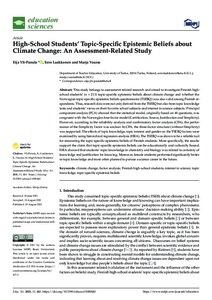High-School Students’ Topic-Specific Epistemic Beliefs about Climate Change: An Assessment-Related Study
Yli-Panula Eija; Laakkonen Eero; Vauras Marja
https://urn.fi/URN:NBN:fi-fe2021093048369
Tiivistelmä
This study belongs to assessment-related research and aimed to investigate Finnish high- school students’ (n = 211) topic-specific epistemic beliefs about climate change and whether the Norwegian topic-specific epistemic beliefs questionnaire (TSEBQ) was also valid among Finnish re- spondents. Thus, research data were not only derived from the TSEBQ but also from topic knowledge tests and students’ views on their favorite school subjects and interest in science subjects. Principal component analysis (PCA) showed that the statistical model, originally based on 49 questions, was congruent with the Norwegian four-factor model (Certification, Source, Justification and Simplicity). However, according to the reliability analysis and confirmatory factor analysis (CFA), the perfor- mance of the Simplicity factor was unclear. In CFA, the three-factor structure (without Simplicity) was supported. The effects of topic knowledge, topic interest and gender on the TSEBQ factors were examined by using hierarchical regression analysis (HRA). The TSEBQ was shown to be a reliable tool for measuring the topic-specific epistemic beliefs of Finnish students. More specifically, the results support the claim that topic-specific epistemic beliefs can be educationally and culturally bound. HRA showed that students’ topic knowledge in chemistry and biology was related to certainty of knowledge and justification for knowing. Moreover, female students performed significantly better in topic knowledge and more often planned to pursue a science career in the future.
Kokoelmat
- Rinnakkaistallenteet [27094]
